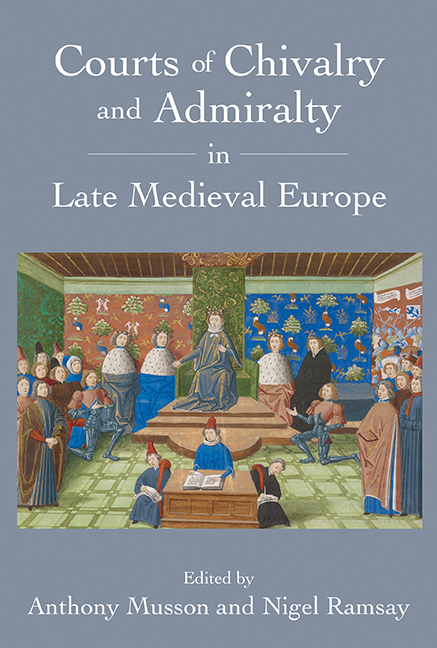Book contents
- Frontmatter
- Contents
- List of Illustrations
- Notes on Contributors
- Preface
- A Note on Editorial Practice
- List of Abbreviations
- Introduction
- Chapter 1 Heralds and the Court of Chivalry: From Collective Memory to Formal Institutions
- Chapter 2 French Armorial Disputes and Controls
- Chapter 3 Art, Objects and Ideas in the Records of the Medieval Court of Chivalry
- Chapter 4 Sir Robert Grosvenor and the Scrope–Grosvenor Controversy
- Chapter 5 From Brittany to the Black Sea: Nicholas Sabraham and English Military Experience in the Fourteenth Century
- Chapter 6 ‘Armed and redy to come to the felde’: Arming for the Judicial Duel in Fifteenth-Century England
- Chapter 7 The Jurisdiction of the Constable and Marshals of France in the Later Middle Ages
- Chapter 8 The Origins and Jurisdiction of the English Court of Admiralty in the Fourteenth Century
- Chapter 9 The Consulate of the Sea and its Fortunes in Late Medieval Mediterranean Countries
- Chapter 10 The Admiralty and Constableship of England in the Later Fifteenth Century: The Operation and Development of these Offices, 1462–85, under Richard, Duke of Gloucester and King of England
- Chapter 11 Some Dubious Beliefs about Medieval Prize Law
- index
Chapter 5 - From Brittany to the Black Sea: Nicholas Sabraham and English Military Experience in the Fourteenth Century
Published online by Cambridge University Press: 28 June 2018
- Frontmatter
- Contents
- List of Illustrations
- Notes on Contributors
- Preface
- A Note on Editorial Practice
- List of Abbreviations
- Introduction
- Chapter 1 Heralds and the Court of Chivalry: From Collective Memory to Formal Institutions
- Chapter 2 French Armorial Disputes and Controls
- Chapter 3 Art, Objects and Ideas in the Records of the Medieval Court of Chivalry
- Chapter 4 Sir Robert Grosvenor and the Scrope–Grosvenor Controversy
- Chapter 5 From Brittany to the Black Sea: Nicholas Sabraham and English Military Experience in the Fourteenth Century
- Chapter 6 ‘Armed and redy to come to the felde’: Arming for the Judicial Duel in Fifteenth-Century England
- Chapter 7 The Jurisdiction of the Constable and Marshals of France in the Later Middle Ages
- Chapter 8 The Origins and Jurisdiction of the English Court of Admiralty in the Fourteenth Century
- Chapter 9 The Consulate of the Sea and its Fortunes in Late Medieval Mediterranean Countries
- Chapter 10 The Admiralty and Constableship of England in the Later Fifteenth Century: The Operation and Development of these Offices, 1462–85, under Richard, Duke of Gloucester and King of England
- Chapter 11 Some Dubious Beliefs about Medieval Prize Law
- index
Summary
It has long been recognised that the recorded testimony of witnesses in the armorial cases before the Court of Chivalry provides an abundance of information about the military careers of both the witnesses themselves and the families whose armorial claims they were supporting. These recollections of campaigns, well-known and obscure, are in themselves invaluable and they are made all the more so when they can be corroborated and supplemented by data found in governmental military–administrative records: muster rolls, retinue lists and the documentation generated by the issue of letters of protection and grants of pardon. Enriched in this way, Court of Chivalry testimony can add a precise and structured martial dimension to an all-too-often shadowy life story. For some witnesses, it was the predominant dimension of their lives, at least in the ‘public’ sphere. And while recapturing the essence of individual military careers is worthwhile and interesting, research of this kind is elevated to an altogether higher level when men are studied in groups as well: when biographical work becomes prosopography and when the architecture and dynamics of social networks are investigated. As a contribution to this broader research agenda, this chapter seeks to show how the careers of individual witnesses, as revealed by their enriched Court of Chivalry testimony, can be further illuminated when they are viewed alongside those of their (often more fully documented) associates and located within the wider military–prosopographical landscape. Within the compass of one chapter, this task is necessarily approached through a case study focusing on the career of one Court of Chivalry witness. There are, however, advantages in such an approach, not least that richness of detail can be combined with an elaborated context, yielding a methodological model that may commend itself for wider application.
A soldier's testimony before the Court of Chivalry
On 17 September 1386, in the chapter house of York Minster, Nicholas Sabraham, esquire, provided testimony in support of Richard, Lord Scrope of Bolton's right to the arms Azure a bend or, which was being asserted against the claims of Sir Robert Grosvenor of Cheshire. (See Plates IV and V for illustrations of the arms.) Aged sixty years and more, and drawing on a career with the sword that had begun in the 1340s, Sabraham is one of the most celebrated of all Court of Chivalry witnesses.
- Type
- Chapter
- Information
- Courts of Chivalry and Admiralty in Late Medieval Europe , pp. 95 - 128Publisher: Boydell & BrewerPrint publication year: 2018



